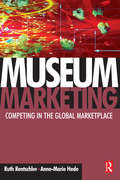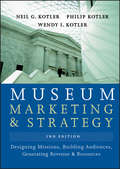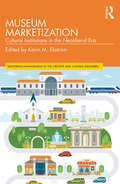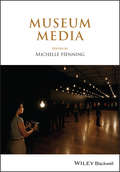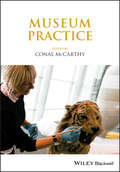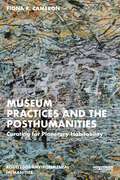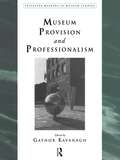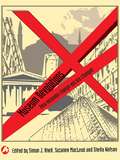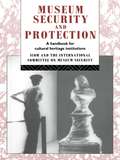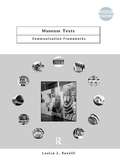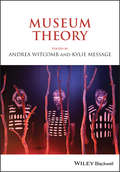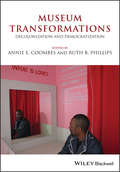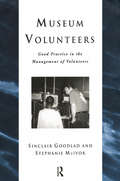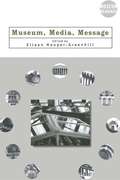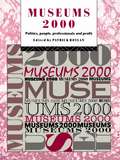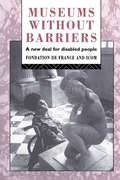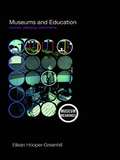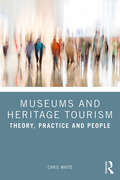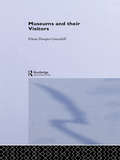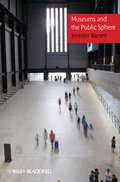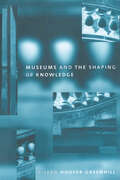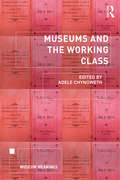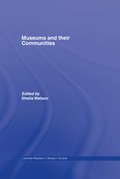- Table View
- List View
Museum Marketing
by Ruth Rentschler Anne-Marie HedeMuseums have moved from a product to a marketing focus within the last ten years. This has entailed a painful reorientation of approaches to understanding visitors as ‘customers’; new ways of fundraising and sponsorship as government funding decreases; and grappling with using the internet for marketing. This book brings the latest in marketing thinking to bear on the museum sector taking into account both the commercial issues and social mission it involves. Carefully structured to be highly accessible the book offers: * A contemporary and relevant and global approach to museum marketing written by authors in Britain, Australia, the United States, and Asia * An approach that reflects the particular challenges museums of varying sizes face when seeking to market an experience to a diverse set of stakeholders: audience; funders; sponsors and government. * A particular focus on museum marketing in the 'Information Age'* Major case studies at the beginning and end of each section of the book, and smaller case studies within chapters The hugely experienced author team, includes both leading academics and practitioners to ensure the book has broad appeal and is both relevant, innovative and progressive in approach. It will be essential reading for students in museum studies, non-profit marketing, and arts management and marketing. It will also be equally relevant for professionals working in and managing museums and galleries, heritage attractions and ministries of arts.
Museum Marketing and Strategy: Designing Missions, Building Audiences, Generating Revenue and Resources
by Philip Kotler Wendy I. Kotler Neil G. KotlerThis newly revised and updated edition of the classic resource on museum marketing and strategy provides a proven framework for examining marketing and strategic goals in relation to a museum's mission, resources, opportunities, and challenges. Museum Marketing and Strategy examines the full range of marketing techniques and includes the most current information on positioning, branding, and e-marketing. The book addresses the issues of most importance to the museum community and shows how to Define the exchange process between a museum's offerings and consumer value Differentiate a museum and communicate its unique value in a competitive marketplace Find, create, and retain consumers and convert visitors to members and members to volunteers and donors Plan strategically and maximize marketing's value Achieve financial stability Develop a consumer-centered museum
Museum Marketization: Cultural Institutions in the Neoliberal Era (Mastering Management in the Creative and Cultural Industries)
by Karin M. EkströmThis wide-ranging book explores the impact of marketization on the creative industries. With critical perspectives from a variety of disciplines and global experts, numerous examples from international cultural institutions are employed to illuminate the topic. Culture and business have become increasingly intertwined, and cultural institutions need to be aware of their place in the market. Commercial awareness, which was previously disparaged, is now seen as a legitimate and necessary response to increased competition, enhancing experience, increasing accessibility, broadening inclusivity and sustainable futures with diminishing funding. The contributions to this book highlight that marketing, public relations, sponsorship and fundraising have become integral to the survival of many museums, galleries and events. Of interest to students and scholars across topics such as arts marketing, arts administration, heritage marketing and museum studies, the book is also insightful for reflective practitioners in the creative sector.
Museum Media (Issues In Cultural And Media Studies)
by Michelle HenningMUSEUM MEDIA Edited by Michelle Henning Museum Media explores the contemporary uses of diverse media in museum contexts and discusses how technology is reinventing the museum. It considers how technological changes—from photography and television through to digital mobile media—have given rise to new habits, forms of attention and behaviors. It explores how research methods can be used to understand people's relationships with media technologies and display techniques in museum contexts, as well as the new opportunities media offer for museums to engage with their visitors. Entries written by leading experts examine the transformation of history and memory by new media, the ways in which exhibitions mediate visitor experience, how designers and curators can establish new kinds of relationships with visitors, the expansion of the museum beyond its walls and its insertion into a wider commercial and corporate landscape. Focusing on formal, theoretical and technical aspects of exhibition practice, this in-depth volume explores questions of temporality, attachment to objects, atmospheric and immersive exhibition design, the reinvention of the exhibition medium, and much more.
Museum Practice: Heritage Professionals, Indigenous Collections, Current Practice
by Conal McCarthyMUSEUM PR ACTICE Edited by CONAL MCCARTHY Museum Practice covers the professional work carried out in museums and art galleries of all types, including the core functions of management, collections, exhibitions, and programs. Some forms of museum practice are familiar to visitors, yet within these diverse and complex institutions many practices are hidden from view, such as creating marketing campaigns, curating and designing exhibitions, developing fundraising and sponsorship plans, crafting mission statements, handling repatriation claims, dealing with digital media, and more. Focused on what actually occurs in everyday museum work, this volume offers contributions from experienced professionals and academics that cover a wide range of subjects including policy frameworks, ethical guidelines, approaches to conservation, collection care and management, exhibition development and public programs. From internal processes such as leadership, governance and strategic planning, to public facing roles in interpretation, visitor research and community engagement and learning, each essential component of contemporary museum practice is thoroughly discussed.
Museum Practices and the Posthumanities: Curating for Planetary Habitability (Routledge Environmental Humanities)
by Fiona R. CameronThis book critiques modern museologies and curatorial practices that have been complicit in emerging existential crises. It confidently presents novel, more-than-human curatorial visions, methods, frameworks, policies, and museologies radically refiguring the epistemological foundations of curatorial, museological thinking, and practice for a habitable planet. Modern curatorial and museological practices are dominated by modern humanism in which capital growth, social, technological advancement, hubris, extraction, speciest logics, and colonial domination predominate, often without reflection. While history, science, and technology museums and their engagement with non-human worlds have always been ecological as an empirical reality, the human-centred frameworks and forms of human agency that institutions deploy tend to be non-cognizant of this reality. Museum Practices and the Posthumanities: Curating for Planetary Habitability reveals how these practices are ill-equipped to deal with the contemporary world of rapid digital transformations, post-Covid living, climate change, and its impacts among other societal changes, and it shows how museums might best meet these challenges by thinking with and in more-than-human worlds. This book is aimed at museological scholars and museum professionals, and it will provide them with the inspiration to conduct research on and curate from a different ecological reference point to promote a world good enough for all things to thrive in radical co-existence.
Museum Provision and Professionalism (Leicester Readers in Museum Studies)
by Gaynor KavanaghMuseums are public places where objects, images and memories are kept and shared. They exist in infinite variety and contradiction. They can be places of great excitement and great boredom, sharply insightful and hopelessly bland. Museums are anything that the political climate and the imagination allows them to be. No two museums are the same. The papers which make up this volume give ample evidence of the variety of views that exist about museums. They also demonstrate that museums and museum professionals are moving forward with energy and conviction. This volume will be invaluable to students and museum professionals and will provoke them to consider museum provision and professionalism in all their forms.
Museum Revolutions: How museums change and are changed
by Sheila Watson Simon J. Knell Suzanne MacLeodThis single-volume museum studies reference title explores the ways in which museums are shaped and configured and how they themselves attempt to shape and change the world around them. Written by a leading group of museum professionals and academics from around the world and including new research, the chapters reveal the diverse and subtle means by which museums engage and in so doing change and are changed. The authors span over 200 years discussing national museums, ecomuseums, society museums, provincial galleries, colonial museums, the showman’s museum, and science centres. Topics covered include: disciplinary practices, ethnic representation, postcolonial politics, economic aspiration, social reform, indigenous models, conceptions of history, urban regeneration, sustainability, sacred objects, a sense of place, globalization, identities, social responsibility, controversy, repatriation, human remains, drama, learning and education. Capturing the richness of the museum studies discipline, Museum Revolutions is the ideal text for museum studies courses, providing a wide range of interlinked themes and the latest thought and research from experts in the field. It is invaluable for those students and museum professionals who want to understand the past, present and future of the museum.
Museum Security and Protection: A Handbook for Cultural Heritage Institutions (Heritage: Care-Preservation-Management)
by David ListonThe ICMS Handbook is acknowledged as the international standard text for basic security procedures. It was first published as A Basic Guide to Museum Security, and is now fully revised, enlarged and updated. The manual covers: general principles security, theft and burglary: security personnel; training; collection management and transport; disaster planning; fire and environmental hazards; checklist of security procedures. It is designed to operate in all conditions and sizes of museum, not merely those with elaborate electronic security. It stresses that good basic principles are the key to effective protection from hazard.
Museum Texts: Comunication Frameworks (Museum Meanings)
by Louise RavelliAnswering key questions in the study of how museums communicate, Louise Ravelli provides a set of frameworks to investigate the complexities of communication in museums: * What is an appropriate level of complexity for a written label?* Why do some choice in language make a more direct relation to visitors?* Is there a correct way of presenting a particular view of content?* How do design practices contribute to the overall meanings being made? The frameworks enhance the way we critically analyze and understand museums text, both in the sense of conventional – written texts in museums – and in an expanded sense of the museum as a whole operating as a communicative text. Using a wide range of examples Ravelli argues that communication contributes fundamentally to what a museum is, who it relates to and what it stands for. Not only museum studies and communications studies students, but also professionals in the field will find Museum Texts an indispensable guide on communication frameworks.
Museum Theory
by Kylie Message Andrea WitcombMUSEUM THEORY EDITED BY ANDREA WITCOMB AND KYLIE MESSAGE Museum Theory offers critical perspectives drawn from a broad range of disciplinary and intellectual traditions. This volume describes and challenges previous ways of understanding museums and their relationship to society. Essays written by scholars from museology and other disciplines address theoretical reflexivity in the museum, exploring the contextual, theoretical, and pragmatic ways museums work, are understood, and are experienced. Organized around three themes—Thinking about Museums, Disciplines and Politics, and Theory from Practice/Practicing Theory—the text includes discussion and analysis of different kinds of museums from various, primarily contemporary, national and local contexts. Essays consider subjects including the nature of museums as institutions and their role in the public sphere, cutting-edge museum practice and their connections with current global concerns, and the links between museum studies and disciplines such as cultural studies, anthropology, and history.
Museum Transformations: Decolonization and Democratization
by Ruth B. Phillips Annie E. CoombesMUSEUM TRANSFORMATIONS DECOLONIZATION AND DEMOCRATIZATION Edited By ANNIE E. COOMBES AND RUTH B. PHILLIPS Museum Transformations: Decolonization and Democratization addresses contemporary approaches to decolonization, greater democratization, and revisionist narratives in museum exhibition and program development around the world. The text explores how museums of art, history, and ethnography responded to deconstructive critiques from activists and poststructuralist and postcolonial theorists, and provided models for change to other types of museums and heritage sites. The volume's first set of essays discuss the role of the museum in the narration of difficult histories, and how altering the social attitudes and political structures that enable oppression requires the recognition of past histories of political and racial oppression and colonization in museums. Subsequent essays consider the museum's new roles in social action and discuss experimental projects that work to change power dynamics within institutions and leverage digital technology and new media.
Museum Volunteers: Good Practice in the Management of Volunteers (Heritage: Care-Preservation-Management)
by Sinclair Goodlad Stephanie McIvorMuseum Volunteers is a practical handbook on the use of volunteers as interpreters within museums. Drawing on key examples of outstanding practice from the UK and North America, this book forms a unique resource on volunteerism.This book:* reviews research on the changing priorities of museums* examines a form of volunteering that has provided benefits to all participants in an activity similar to museum interpretation - student tutoring* describes and analyses the strengths of five exceptional volunteer programmes in Canada and the USA* reports the finding of five volunteer programmes set up and managed by the authors in the Science Museum, London* examines the development process of the pilot studies and the consequent establishment of a permanent volunteer programme in the Science Museum, London* discusses the mutual benefits that volunteer programmes can bring to museums and volunteers* offers suggestions on the practical day-to-day management and administration of volunteers.This book is essential reading for anyone involved with the management and administration of a museum, or, is thinking of offering their services to a museum as a volunteer.
Museum of Fine Arts Boston
by V. Kasturi RanganOne of Boston's main cultural attractions, the Museum of Fine Arts (MFA), has experienced a steady decline of its core audience over the last decade. The museum's executive director attempted to bridge the shortfall by staging new, innovative, special exhibitions, which have not been without their share of criticism. The museum's top management had to resolve the audience issue against the background of a major $500 million capital campaign to fund a new wing of the museum in 2010.
Museum of Fine Arts Boston/Fleet Financial Group Sponsorship of Monet in the 20th Century
by Stephen A. GreyserThe Museum of Fine Arts in Boston and Fleet Financial Group's sponsored the Monet in the 20th Century exhibition, the world's largest, in 1998. The case chronicles the solicitation of a large corporate sponsor, as well as the growth and development of their partnership. Includes color exhibits.
Museum, Media, Message (Museum Meanings)
by Eilean Hooper-GreenhillCollecting together a group of talented writers, Museum, Media, Message considers, in depth, the most up-to-date approaches to museum communication including: museums as media; museums and audience; and the evaluation of museums. Addressing the need for museums to develop better knowledge of visitor experience, this volume introduces a broad range of issues, and presents the ultimate how, why and who of museum communication. Museum, Media, Message combines philosophical discussion, practical examples and case studies and examines museum communication in three sections: analyzing how museums and galleries construct and transmit complex systems of value through processes of collection and exhibition raising philosophical and management issues and exploration of work with specific audiences introducing methods for studying the audiences’ experiences of communication events in museums. Perfect for people who want to develop a more critical and informed professional museum practice, and for students looking to enhance their skills of analysis and reflection, this book is of value to anyone interested in the current debates and issues of this new and growing field.
Museums 2000: Politics, People, Professionals and Profit (Heritage: Care-Preservation-Management)
by Patrick J. BoylanMuseum and art galleries have never been so much in the news as they have been over the past decade. Yet public focus at both professional and non-specialist levels has been remarkable for what has been accidentally or deliberatley left out of recent debates. Moving beyond the narrow issues of professional practice, Museums 2000 probes the political, economic and cultural realities which affect museums today. Because the contributos are drawn from the museum profession and the wider political, academic and business community worldwide, the book is truly international, reflecting the issues which affect all museums.
Museums Without Barriers: A New Deal For the Disabled (Heritage: Care-Preservation-Management)
by Fondation de France/ICOMEssential reading for all professionals concerned with museums and the cultural heritage, with the architecture and design of museums and for those providing service for the disabled. The volume provides access to some of the best practice in the provision for the disabled, and sets out an agenda for future action in museums worldwide.
Museums and Education: Purpose, Pedagogy, Performance (Museum Meanings)
by Eilean Hooper-GreenhillAt the beginning of the 21st century museums are challenged on a number of fronts. The prioritisation of learning in museums in the context of demands for social justice and cultural democracy combined with cultural policy based on economic rationalism forces museums to review their educational purposes, redesign their pedagogies and account for their performance. The need to theorise learning and culture for a cultural theory of learning is very pressing. If culture acts as a process of signification, a means of producing meaning that shapes worldviews, learning in museums and other cultural organisations is potentially dynamic and profound, producing self-identities. How is this complexity to be ‘measured’? What can this ‘measurement’ reveal about the character of museum-based learning? The calibration of culture is an international phenomenon, and the measurement of the outcomes and impact of learning in museums in England has provided a detailed case study. Three national evaluation studies were carried out between 2003 and 2006 based on the conceptual framework of Generic Learning Outcomes. Using this revealing data Museums and Education reveals the power of museum pedagogy and as it does, questions are raised about traditional museum culture and the potential and challenge for museum futures is suggested.
Museums and Heritage Tourism: Theory, Practice and People
by White ChrisThis book examines the symbiotic relationship between museums, heritage attractions and tourism, using a range of international case studies. Divided into three clear sections, the author first outlines a theoretical framework for understanding the role of museums in heritage tourism, before addressing practical challenges of interpretation, design and pandemic response. Finally, he traces the development of museum and heritage attraction design through the key figures of John Ruskin, James Gardner and Alex McCuaig. Each chapter incorporates a key case study, with an international scope including examples from Hong Kong, the UK, Taiwan, Qatar, Dubai and Kuwait. An essential introduction for undergraduate and graduate students taking courses in museum studies, heritage studies, and tourism management.
Museums and Their Visitors (Heritage: Care-Preservation-Management)
by Eilean Hooper-GreenhillMuseums are at a critical moment in their history. In order to ensure survival into the next century, museums and galleries must demonstrate their social relevance and use. This means developing their public service functions through becoming more knowledgeable about the needs of their visitors and more adept at providing enjoyable and worthwhile experiences.Museums and Their Visitors aims to help museums and galleries in this crucial task. It examines the ways in which museums need to develop their communicative functions and, with examples of case-studies, explains how to achieve best practice. The special needs of a number of target audiences including schools, families and people with disabilities are outlined and illustrated by examples of exhibition, education and marketing policies. The book looks in detail at the power of objects to inspire and stimulate and analyses the use of language in museums and galleries.This is the first book to be written to guide museum and gallery staff in the development of provision for their visitors. It will be of interest to students of museum, heritage and leisure and tourism studies, as well as to international museum professionals.
Museums and the Public Sphere
by Jennifer BarrettMuseums and the Public Sphere investigates the role of museums around the world as sites of democratic public space. Explores the role of museums around the world as sites of public discourse and democracy Examines the changing idea of the museum in relation to other public sites and spaces, including community cultural centers, public halls and the internet Offers a sophisticated portrait of the public, and how it is realized, invoked, and understood in the museum context Offers relevant case studies and discussions of how museums can engage with their publics' in more complex, productive ways
Museums and the Shaping of Knowledge
by Eileen Hooper GreenhillMuseums have been active in shaping knowledge over the last six hundred years. Yet what is their function within today's society? At the present time, when funding is becoming increasingly scarce, difficult questions are being asked about the justification of museums. Museums and the Shaping of Knowledge presents a critical survey of major changes in current assumptions about the nature of museums. Through the examination of case studies, Eilean Hooper-Greenhill reveals a variety of different roles for museums in the production and shaping of knowledge. Today, museums are once again organising their spaces and collections to present themselves as environments for experimental and self-directed learning.
Museums and the Working Class (Museum Meanings)
by Adele ChynowethMuseums and the Working Class is the first book to take an intersectional and international approach to the issues of economic diversity and class within the field of museum studies. Bringing together 16 contributors from eight countries, this book has emerged from the significant global dialogue concerning museums’ obligation to be inclusive, participate in meaningful engagement and advocate for social change. As part of the push for museums to be more accessible and inclusive, museums have been challenged to critically examine their power relationships and how these are played out in what they collect, whose stories they exhibit and who is made to feel welcome in their halls. This volume will further this professional and academic debate through the discussion of class. Contributions to the book will also reinforce the importance of the working class – not only in collection and exhibition policy, but also for the organisational psychology of institutions. Museums and the Working Class is essential reading for scholars and students of museum, gallery and heritage studies, cultural studies, sociology, labour studies and history. It will also serve as a source of honest and research-led inspiration to practitioners working in museums, galleries, libraries, archives and at heritage sites around the world.
Museums and their Communities (Leicester Readers in Museum Studies)
by Sheila WatsonUsing case studies drawn from all areas of museum studies, Museums and their Communities explores the museums as a site of representation, identity and memory, and considers how it can influence its community. Focusing on the museum as an institution, and its social and cultural setting, Sheila Watson examines how museums use their roles as informers and educators to empower, or to ignore, communities. Looking at the current debates about the role of the museum, she considers contested values in museum functions and examines provision, power, ownership, responsibility, and institutional issues. This book is of great relevance for all disciplines as it explores and questions the role of the museum in modern society.
